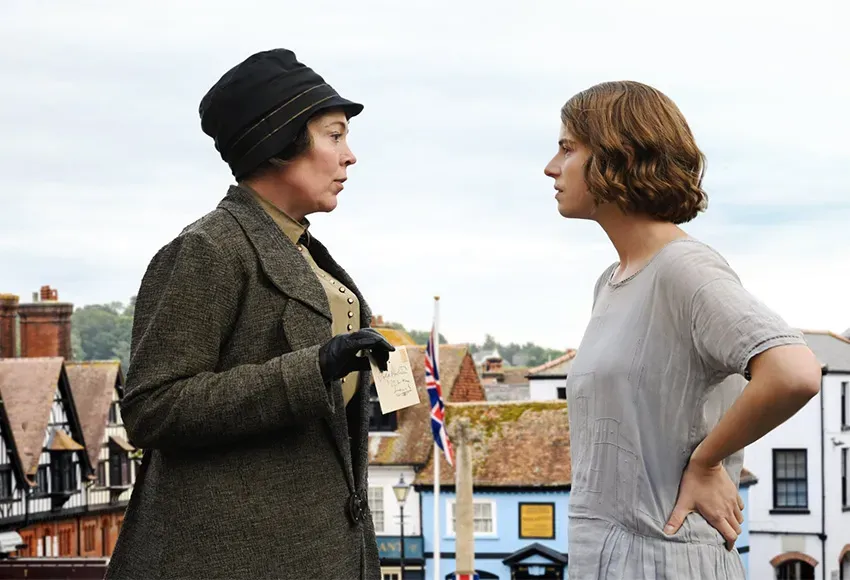WICKED LITTLE LETTERS
Theaters
When the seaside community of Littlehampton is rocked by a vulgar scandal, all eyes turn toward Rose Gooding (Jessie Buckley), an Irish single mother who moved into town at the end of the Great War, after her husband tragically died on the battlefield. Rowdy and unconventional, this woman is predictably an outcast in certain quarters of this relatively conservative community, so to the mostly male eyes of the local police force, it makes sense that she would be the cause of all of their recent misfortune.
And what is all of the hullabaloo about? The pious Edith Swan (Olivia Colman), who lives in her childhood home, taking care of her deeply religious parents Edward (a terrifying Timothy Spall) and Victoria (Gemma Jones), has been receiving anonymous letters filled with sexually charged innuendoes and filthy profanities. Edward despised Rose from the start, and while his daughter initially tried to make friends with their new neighbor, he believes a public confrontation between his family and the young woman has led to all of this vile hate mail that's been suddenly coming their way.
Wicked Little Letters is one of those stories that would never be believable if it hadn't actually happened, inspired by real events that rocked England's snobby, puritanical male authority figures during the 1920s. It will not come as a surprise, then, that precious little involving these foul-mouthed diatribes is exactly as it seems. There's no way Rose wrote those letters, and that means the central mystery revolves around who is penning them and what they are hoping to achieve by sending them to Edith.
Granted, that's not actually much of a whodunit. But this subplot does allow screenwriter Jonny Sweet and director Thea Sharrock (Me Before You) to craft a bevy of eccentric supporting characters – all of whom are portrayed by an eclectically diverse and engagingly talented ensemble of familiar faces – who play a part in uncovering the culprit's identity. This cadre of women run around looking for clues and hunting suspects as if they were in a story penned by Sir Arthur Conan Doyle and then rewritten by Scooby-Doo! creators Joe Ruby and Ken Spears. It's that silly, and almost that entertaining as well.
Anjana Vasan is the focal point for this section of the tale, as Gladys Moss (or "Woman Police Officer Gladys Moss," as her male superiors are fond of calling her), a new member of the local constabulary and the first person to believe Rose may be innocent. Vasan is terrific, balancing comedy and drama with confident precision. Her best bits are in tandem with the great Eileen Atkins and BAFTA-winning character actor Joanna Scanlan. Without saying too much, they join up to assist with Moss's investigation, and all three play off one another with charming aplomb.
As enjoyable as these scenes may be and as strong as the performances from Vasan, Atkins, and Scanlan are, none of their efforts would matter if not for the combined magnetism and magnificence of Colman and Buckley. Edith and Rose are the main characters, and it is their journey that powers the narrative. The two spectacularly talented actors are at times funny and heartbreaking in equal measure, bringing a pointed and delicately dexterous complexity to their performances that frequently held me spellbound. They are marvelous.
Good thing, too, because for all I adore about Wicked Little Letters, this historically based dramedy isn't without a small post office box full of notable issues. The balance between the three sections – Rose dealing with what might happen to her daughter if she's sent to prison, Edith struggling with the emotional pressures being thrust upon her by her repellently domineering father, and Gladys's dogged pursuit of the truth even as her superiors order her to cease her investigation – is undeniably shaky, and I often felt like Sharrock was on the verge of losing control of them all. The shifts in tone can be jarring, and if Colman and Buckley weren't so amazing, none of this would have amused me nearly as much as it thankfully did.
But they are amazing, and that's what matters. Colman and Buckley know how to make this material sing, and there are moments when both actors managed to make me squeeze out an authentic tear or two, only to have me enthusiastically giggling a scene or two later. They make Edith and Rose's relationship genuine, and as absurd as things become for the two women, the understanding (and maybe even affection?) that blossomed between them filled my heart with joy.
Wicked Little Letters doesn't play coy with its overall messaging. There is something timeless about its life lessons that feels fittingly apropos for this social media age of mixed messages, alternate facts, sexism, misogyny, racism, cultural appropriation, and fascist ideologies reentering the public sphere with such abhorrently unapologetic enthusiasm. What's Rose and Edith's ordeal tells us about ourselves and the times we are living in couldn't be more obvious and, dare I say, essential. That it happens to be so richly beguiling, humanistically sincere, and empathetically rewarding at the same time is what makes it worthwhile.


